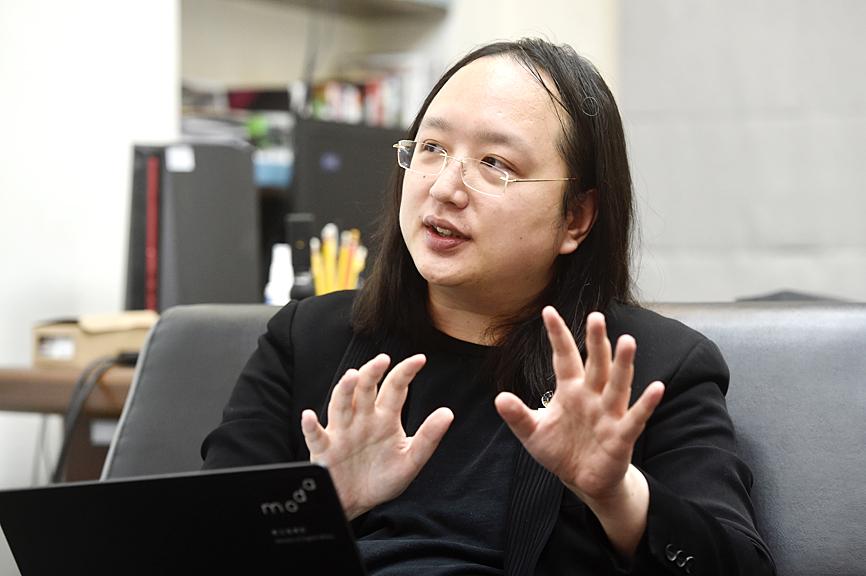The Ministry of Digital Affairs is to be launched on Aug. 27, with Minister Without Portfolio Audrey Tang (唐鳳) serving as its first minister, Executive Yuan spokesman Lo Ping-cheng (羅秉成) said yesterday.
The new ministry is to promote interdisciplinary cooperation in digital services, complete and apply the “Data for Social Good” system and facilitate technology and data democratization.
National Yang Ming Chiao Tung University associate engineering professor Chiueh Her-ming (闕河鳴) and iPass Corp chairman Lee Huai-jen (李懷仁) are to serve as political deputy ministers.

Photo: Tsung Chang-chin, Taipei Times
Tang must relinquish her minister without portfolio duties before assuming the position, Lo said, adding that her successor would be announced later.
The new ministry is to consist of the Administration for Digital Industries; the Administration for Cyber Security; the National Institute of Cyber Security, which is to be established by the end of the year; and three foundations, including the Institute for Information Industry, the Telecom Technology Center and the Taiwan Network Information Center.
The ministry is to integrate the associated services of the National Communications Commission, the Ministry of Economic Affairs, the Ministry of Transportation and Communications, the National Development Council and the Cabinet’s Department of Cyber Security.
Academics hope that the new ministry would help government and business build an “information security moat” against cyberattacks as tensions across the Taiwan Strait rise.
Chiang Ya-chi (江雅綺), director of the Taiwan Law and Technology Association and an associate professor at National Taiwan Ocean University’s College of Ocean Law and Policy, said that digital industries are hopeful that Tang can develop thorough strategies to guide them through digital transitions.
Taiwan should have laws similar to the EU’s Digital Markets Act and Digital Services Act, she said.
The government should set clear regulations on information security and personal information protection, as data economics is playing a greater role in business and trade, she said.
The ministry can help government agencies with digital transformation, and build a solid foundation for digital governance, Chiang said.
Such governance requires cooperation between various agencies, making communication between agencies a primary challenge for the new ministry, she added.
The Open Culture Foundation, the Taiwan Association for Human Rights, the Software Liberty Association Taiwan, the Coalition of Taiwan Civil Service Reform Drivers and Amnesty International Taiwan issued a statement last month calling on the new ministry to consider human rights while drafting its administrative plan.

Taiwan has received more than US$70 million in royalties as of the end of last year from developing the F-16V jet as countries worldwide purchase or upgrade to this popular model, government and military officials said on Saturday. Taiwan funded the development of the F-16V jet and ended up the sole investor as other countries withdrew from the program. Now the F-16V is increasingly popular and countries must pay Taiwan a percentage in royalties when they purchase new F-16V aircraft or upgrade older F-16 models. The next five years are expected to be the peak for these royalties, with Taiwan potentially earning

STAY IN YOUR LANE: As the US and Israel attack Iran, the ministry has warned China not to overstep by including Taiwanese citizens in its evacuation orders The Ministry of Foreign Affairs (MOFA) yesterday rebuked a statement by China’s embassy in Israel that it would evacuate Taiwanese holders of Chinese travel documents from Israel amid the latter’s escalating conflict with Iran. Tensions have risen across the Middle East in the wake of US and Israeli airstrikes on Iran beginning Saturday. China subsequently issued an evacuation notice for its citizens. In a news release, the Chinese embassy in Israel said holders of “Taiwan compatriot permits (台胞證)” issued to Taiwanese nationals by Chinese authorities for travel to China — could register for evacuation to Egypt. In Taipei, the ministry yesterday said Taiwan

‘LIKE-MINDED PARTNER’: Tako van Popta said it would be inappropriate to delay signing the deal with Taiwan because of China, adding he would promote the issue Canadian senators have stressed Taiwan’s importance for international trade and expressed enthusiasm for ensuring the Taiwan-Canada trade cooperation framework agreement is implemented this year. Representative to Canada Harry Tseng (曾厚仁) in an interview with the Central News Agency (CNA) said he was increasingly uneasy about Ottawa’s delays in signing the agreement, especially as Ottawa has warmed toward Beijing. There are “no negotiations left. Not only [is it] initialed, we have three versions of the text ready: English, French and Mandarin,” Tseng said. “That tells you how close we are to the final signature.” Tseng said that he hoped Canadian Prime Minister Mark Carney

POSITIVE DEVELOPMENT: Japan and the US are expected to hold in-depth discussions on Taiwan-related issues during the meeting next month, Japanese sources said The holding of a Japan-US leaders’ meeting ahead of US President Donald Trump’s visit to China is positive news for Taiwan, former Japan-Taiwan Exchange Association representative Hiroyasu Izumi said yesterday. After the Liberal Democratic Party’s landslide victory in Japan’s House of Representatives election, Japanese Prime Minister Sanae Takaichi is scheduled to visit the US next month, where she is to meet with Trump ahead of the US president’s planned visit to China from March 31 to April 2 for a meeting with Chinese President Xi Jinping (習近平). Japan and the US are expected to hold in-depth discussions on Taiwan-related issues during the